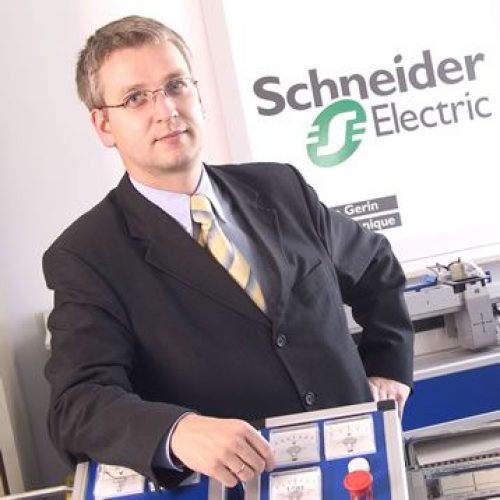In Schneider Electric corporation the flow of knowledge can take the form of regular meetings of representatives of the countries in which the SE units use the management-support SAP system.
During such meetings, held once in six months, knowledge is passed and new ideas that may improve the functioning of all the business standard of the concern are presented. Such ideas are shown in the form of the so-called Best Practices, those worth copying.
Polish benchmark
During one of those meetings as a Best Practice was presented the business-IT standard in managing contract operations, worked out in w Schneider Electric Polska with the support of BCC. The solution is based on the module PS (Project System) of the SAP system.
The Polish project was received with enthusiasm, especially because PS was not widely used in other units of the concern and in places where it functioned, it was not used to its best advantage in managing contract operations.
PS functions in Schneider Electric
- complete service of the processes of design, acquisition (through purchase or own manufacture) and installing electrotechnical devices
- managing projects that involve processing applications of automatic engineering systems
- managing logistic processes in projects: allocating products, goods and services to projects in order to buy them or start manufacturing
- keeping project accountancy: automatic registration of expected income on the basis of incoming customer orders; implementing plan of expenses
- registering services carried out for the projects
- servicing the distribution of machines to their installation place settling payroll costs (with the use of inter-application worktime sheet CATS)
- servicing internal and external training
There were no doubts concerning the Polish standard; it was very well adjusted and proved itself in practice.
Thus the solution was recognized by international environment as a model one and more countries are deciding to use it.

‘PS proved itself in our company as a solution that appropriately integrates all the modules in logistics and finance, also in terms of active work time recording. A direct proof of its appropriate adjustment was significant improvement in internal processes in managing contract operations as well as satisfaction of external customers that is reflected in a constant increase of contracts in the Polish unit’, said Maciej Mazuruk, director for logistics and customer support in Schneider Electric, who on his own initiative presented the Polish standard at an international meeting of Schneider Electric representatives and also initiated the idea to move ‘Polish’ PS to other countries.
What else caused such a high evaluation and a choice of the Polish business standard?
Certainly the fact that Poland is a country with wide ‘contract’ operations, which, opposite to repetitive sales or discrete manufacturing is marked by big variety. Contract operations in Schneider Electric are significantly different from discrete manufacturing, which is creating repetitive products, machinery or equipment. Contracts involve project production, which concerns non-discrete manufacturing or services that do not repeat themselves.
In the Polish unit of Schneider Electric this area of operations constitues quite a large, 20% share in income. Additionally, the contracts are very varied, thanks to which they include all possible types that may appear in other countries.
So if in Poland all types of contract have been managed by SAP (PS module), one can infere that in other ocuntries this model will help to manage all possible kinds of contracts.
Important contract operations
PS solution supports a vital aspect of company operations, namely managing contracts connected with designing and installing electrotechnical equipment for the needs of such areas as construction, power industry, mining, shipbulding, fuel and chemical industries.
Maciej Mazuruk comments: ‘Implementing the PS module gave project managers a tool to help them manage their projects. PS helps them, for example, answer the question whether the machines for the project have already been ordered and when they are expected to be delivered. On the other hand, controllers have got a tool to systematize and facilitate financial evaluation of projects, assess results in given periods and discover unfavourable deviations early’.
From Poland to Czech and Greece
Implementing a model of contract operations management, supported by the PS module, was an element of a complete implementation of SAP, carried out in Schneider Electric Polska by BCC since 2000. Besides PS it covered financial accountancy, controlling, materials management and supply, production planning, and sales and distribution.
The first phase of the project was a detailed analysis of functioning contract operations in the Polish unit of Schneider.
Curiously enough, besides data from Poland, during preparation of the concept of SAP functioning the BCC consultants also used the experience from the Hungarian unit of the concern, documenting the SAP solutions implemented there.
After this analysis a concept of target model of project system (PS) functioning in Schneider Electric Polska was created. The company has been using it since January 2001, i.e. since the moment it started using SAP system.
After the solution was considered a corporate Best Practice, BCC supported Schneider Electric in moving the PS solution to its Czech (2003) and Greek (2004) units. Model PS solutions were also adopted, to different extents, in Hungary and in France, and next countries where Schneider Electric has its units are already planning to use them.
‘The success of the whole project was greatly due to a way of cooperation proposed by BCC. Since the very beginning the consultants showed a good understanding of Schneider business and created a clear concept of our contract processes. This enabled them to propose a model of PS use unique in all the corporation. The specialists from BCC showed not only specialist knowledge, but also skills in managing project in international environment’, said Maciej Mazuruk.
For the implementation itself, as well as maintaining and developing a model business solution that was worked out in most SAP modules implemented in Poland, especially PS, Schneider Electric Polska suggested creating an internal organisation supporting countries.
The basis for the organisation, called ECO-North Platform, was experience gained during preparation and using SAP solutions in Polish circumstances. Nowadays ECO-North Platform includes five units in Poland, the Czech Republic and Greece (two plants and three commercial units).
Common model is possible
Can commercial units in Poland, Hungary, Greece or France operate according to one common model of project management? Yes, because the business model in Schneider Electricunits managed by PS is similar in all countries.
Every one of those markets is supplied with the same types of products, such as low-voltage machinery, medium-voltage machinery, automatic engineering (devices/ terminals to control production processes), and those products can be used in the same way in market segments such as building, power plants or industry.
Moreover, in all countries the hierarchy of products and customer types are similar too; they include installators, end customers, general contractors or switch gear manufacturers and others.
Using our common standard was possible also owing to the fact that in all Schneider Electric units the process of concluding and executing constracts is similar. The corporation has the same requirements in terms of controlling and local law only makes the difference in assessing and reporting works in process.
Thanks to all the above it was possible to move and use the model created during an implementation in Poland.
Advantages
The most important advantage of PS implementation and its moving to other companies was summed up by Maciej Mazuruk: ‘The whole project allowed Schneider Electric to standardize business understanding of what a project or a contract is. Earlier those terms had been defined in different ways, as sale of a particular machine or a complete delivery of many machines with service.
PS model standardized this matter, thanks to which all contract data (e.g. their profitability) for each country can be compared on the corporate level. Before that it was simply impossible’.
The decision to use a common business model in different countries, apart from the possibility to move the best and tested in Poland business practices, was also influenced by the reduction of costs in implementing PS in other countries.
The described case may be a good example of how knowledge and ideas flow within a corporation and how IT solutions may be used in the best possible way in business. This example is all the more interesting because it does not happen often that moving an IT model from Poland improves business in other countries.
Up to now the concern units have not only been operating more efficiently using Best Practice, but also their operations are more homogenous, which facilitates management on both local and global levels.
Schneider Electricis a world-wide known international concern which implements innovative solutions in the field of automatic engineering and control systems and electrical power distribution. It is a world leader in manufacturing low-voltage machinery and equipment, elements of industrial steering, programmable logic controllers and medium-voltage machinery to distribute electrical power. Some of its products are manufactured in Poland, in plants in Targówek, Warsaw and in Bukowno near Olkusz.


